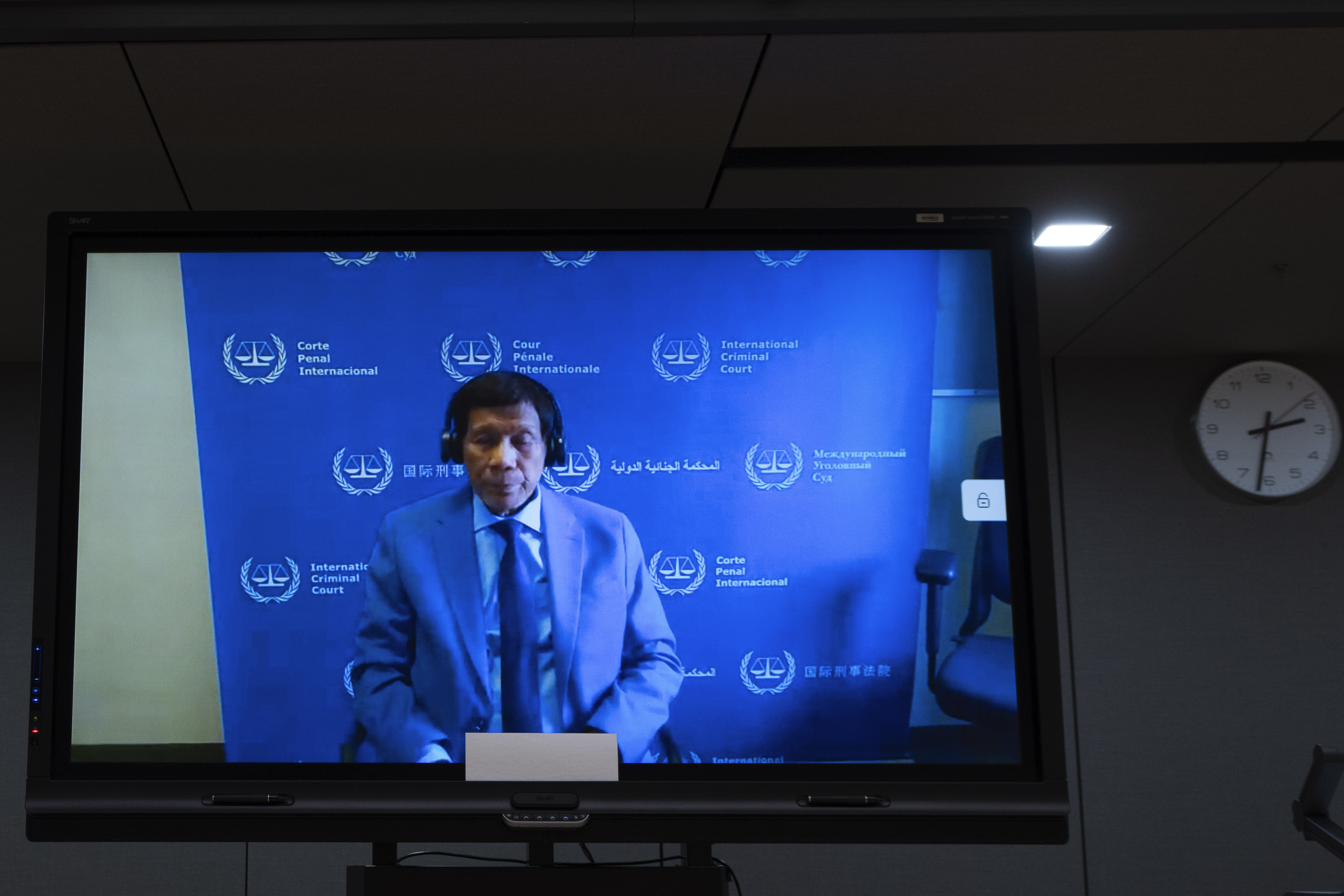Duterte’s ICC case: The legal blunder that must be corrected

Former Philippine President Rodrigo Duterte is seen on a screen in the courtroom of the International Criminal Court (ICC) in The Hague, Netherlands, Friday, March 14, 2025. (AP Photo/Peter Dejong, Pool)
 On March 11, 2025, the International Criminal Court (ICC) issued a warrant of arrest against former Philippine President Rodrigo Roa Duterte – six years after the Philippines formally withdrew from the Rome Statute. This act, unprecedented in the ICC’s history, blatantly violates international law, undermines Philippine sovereignty and exposes our country to a dangerous erosion of constitutional independence.
On March 11, 2025, the International Criminal Court (ICC) issued a warrant of arrest against former Philippine President Rodrigo Roa Duterte – six years after the Philippines formally withdrew from the Rome Statute. This act, unprecedented in the ICC’s history, blatantly violates international law, undermines Philippine sovereignty and exposes our country to a dangerous erosion of constitutional independence.
At the heart of this case is a fundamental principle of international law: pacta tertiis nec nocent nec prosunt – treaties neither harm nor benefit third parties. Codified in Article 34 of the Vienna Convention on the Law of Treaties (1969), this principle holds that no state can be bound by a treaty to which it is no longer a party, unless it expressly consents.
The Philippines’ withdrawal from the Rome Statute became effective on March 17, 2019, a sovereign act duly recognized under international law. Since then, the Philippines ceased to be a State Party. Therefore, any assertion of jurisdiction by the ICC post-withdrawal – especially the issuance of a warrant in 2025 – lacks a legal anchor. It violates not only pacta tertiis, but also the Rome Statute’s own provisions on consent and jurisdiction.
No legal or jurisdictional basis
There is no valid legal basis for the enforcement of the ICC’s warrant of arrest. Article 127(2) of the Rome Statute states that a withdrawing state is not relieved of obligations incurred prior to withdrawal – but this cannot be interpreted to grant perpetual jurisdiction, especially when no formal investigation was authorized before the withdrawal took effect.
Unlike the Burundi precedent – where a full investigation was opened prior to its withdrawal – the ICC had not initiated any formal investigation against the Philippines until well after March 2019. Thus, the temporal jurisdiction of the ICC lapsed when our withdrawal matured. The Court’s March 2025 warrant of arrest is therefore not only procedurally defective – it is legally void.
A sovereign blunder and political capitulation
What is most alarming is that the Philippine government, through omission or willful acquiescence, allowed this surrender to proceed. This action – unilateral, unvetted and devoid of a legal mandate – amounts to an unconstitutional revival of treaty obligations already extinguished.
In doing so, the government committed a historic legal blunder, now rightly perceived by the Filipino people as not merely illegal, but political in nature. It has betrayed the very principle of national sovereignty enshrined in our Constitution. Worse, it has subjected a former President – and by extension, the office of the presidency itself – to the jurisdiction of a foreign court, against the will of the sovereign people and outside the bounds of any existing treaty.
Now, in an urgent response to growing public outrage, the Philippine Senate has opened a formal investigation into the circumstances surrounding PRRD’s arrest and surrender to the ICC. In the course of this investigation, startling allegations have surfaced – including claims that the surrender may amount to kidnapping under Philippine law, as it was done without any enabling law, court order or public accountability.
What must the Senate do
The Senate must recognize that this is not an ordinary case of diplomatic error – it is a constitutional crisis. Should it find that the surrender of PRRD was done illegally, without treaty authority and in violation of due process and domestic law, it must:
- Declare through a Senate resolution that the arrest and surrender of PRRD to the ICC was illegal and unconstitutional.
- Refer the matter to the Department of Justice and the Ombudsman for appropriate criminal investigation – including possible charges of kidnapping, unlawful arrest, and usurpation of authority.
- Propose legislation prohibiting any future surrender of Filipino citizens to foreign tribunals without Senate concurrence and Supreme Court oversight.
- Direct DFA to immediately file a diplomatic note and demand the release of PRRD from ICC custody.
- Hold accountable those public officials and foreign agents, if any, who facilitated or colluded in this illegal surrender.
This blunder must be rectified now
This is not just a legal imperative – it is a national one. The surrender of a former president, under false pretenses and without legal basis, is not only an affront to our sovereignty; it is a betrayal of the people’s trust. If the Senate confirms what the facts already suggest – that PRRD’s arrest lacked both constitutional and treaty basis – then the only moral, legal and political response is to bring him home.
The government must issue a formal apology to the Filipino people, accept responsibility for this blunder and affirm that no future leader shall ever be surrendered to a foreign court absent clear legal authority and the people’s consent.
Let the world hear our unified cry: Justice for PRRD. Bring PRRD home. Defend Philippine sovereignty.
The time to correct this mistake is now – before history records it as the moment we surrendered not just a man, but our very independence.
Atty. Arnedo S. Valera is the executive director of the Global Migrant Heritage Foundation and managing attorney at Valera & Associates, a US immigration and anti-discrimination law firm for over 32 years. He holds a master’s degree in International Affairs and International Law and Human Rights from Columbia University and was trained at the International Institute of Human Rights in Strasbourg, France. He obtained his Bachelor of Laws from Ateneo de Manila University. He is a professor at San Beda Graduate School of Law (LLM Program), teaching International Security and Alliances.

